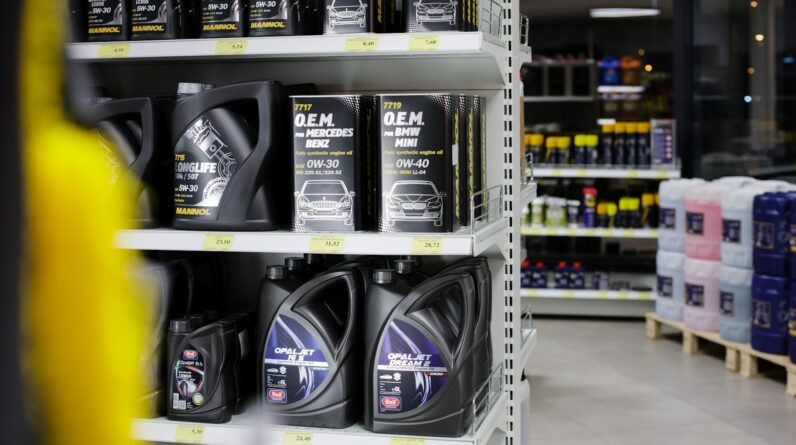
Learn how to choose the best engine oil for your vehicle. Our guide simplifies types, viscosity, and manufacturer specifications to keep your engine running smoothly!
In our latest guide, “How to Choose the Best Engine Oil for Your Vehicle,” we dive into the essentials of selecting the perfect engine oil to keep our engines running smoothly and efficiently. We explore the different types of engine oils, decipher the meaning behind those mysterious numbers and letters on the labels, and provide tips on how to consider factors like climate and driving habits. With our straightforward advice, we can make well-informed decisions that extend the life of our engines and improve overall performance. Together, let’s simplify the process of picking the right motor oil and ensure our vehicles run at their best.
Have you ever wondered how to choose the best engine oil for your vehicle? With the plethora of options available on the market, it can be a daunting task to find the right one. But don’t worry; we’ve got you covered! In this guide, we’ll take you through everything you need to know to make an informed decision that will keep your engine running smoothly and efficiently.
Why is Engine Oil Important?
Engine oil is the lifeblood of our vehicles. It lubricates the moving parts, reduces friction, prevents overheating, and protects the engine from wear and corrosion. Essentially, using the right engine oil is crucial for the overall health and longevity of our vehicles.
Functions of Engine Oil
To appreciate why it’s so critical, let’s briefly look at the primary functions of engine oil:
- Lubrication: Reduces friction between moving parts.
- Cooling: Helps dissipate heat generated by the engine.
- Cleaning: Removes dirt and debris.
- Protection: Guards against wear and corrosion.
- Efficiency: Helps improve fuel economy.
Understanding Engine Oil Types
Knowing the different types of engine oil can make our choice much easier. Let’s break it down into three categories: conventional, synthetic, and blend.
Conventional Oil
This is the most basic type of engine oil, made from refined crude oil. It’s generally cheaper but may not offer the same level of protection and performance as synthetic oils. Conventional oil is often sufficient for older vehicles with simpler engines.
Synthetic Oil
Synthetic oil is engineered to provide superior performance and protection. It’s better at withstanding extreme temperatures and offers improved lubrication. While more expensive, it’s often recommended for modern vehicles and high-performance engines.
Synthetic Blend Oil
As the name suggests, synthetic blend oil offers a mix of conventional and synthetic oils. It provides many of the benefits of synthetic oil, but at a lower cost. This type is a middle-ground option for those who seek enhanced performance without breaking the bank.
| Oil Type | Pros | Cons |
|---|---|---|
| Conventional Oil | Affordable, Easily available | Less protection, More frequent changes needed |
| Synthetic Oil | Superior performance, High protection | More expensive |
| Synthetic Blend | Balanced performance, Cost-effective | May not match the extreme benefits of full synthetic |

Viscosity: What does it Mean?
Viscosity is a crucial factor to consider when choosing engine oil. It refers to the oil’s resistance to flow. The Society of Automotive Engineers (SAE) has a viscosity grading system that we’re sure you’ve seen on oil bottles – something like 5W-30 or 10W-40.
Understanding Viscosity Grade
The SAE grading system seems complicated, but it breaks down quite simply.
- ‘W’ stands for winter. The number preceding the ‘W’ indicates the oil’s viscosity at low temperatures (cold start).
- The number following the ‘W’ represents the oil’s viscosity at high temperatures (operating conditions).
For example, in 5W-30:
- 5W: The oil behaves like a 5-weight oil in cold weather, ensuring easier startups.
- 30: The oil maintains the properties of a 30-weight oil when the engine is running at normal operating temperatures.
Choosing the Right Viscosity
The best viscosity for our vehicles depends on multiple factors, such as the climate we drive in and the manufacturer’s recommendations outlined in the vehicle’s owner manual.
- Cold climates: Lower ‘W’ numbers (e.g., 0W-20, 5W-30)
- Hot climates: Higher ‘W’ numbers (e.g., 10W-30, 20W-50)
Manufacturer Specifications
Most of us may overlook this vital aspect – always refer to the vehicle owner’s manual or manufacturer’s recommendations when selecting engine oil. These guidelines take into account the specific requirements of the engine to ensure optimal performance and protection.
OEM Standards
Original Equipment Manufacturers (OEMs) specify certain standards for engine oils to ensure they provide the necessary performance. Common standards include:
- API: American Petroleum Institute, e.g., API SN, SM
- ACEA: Association des Constructeurs Européens d’Automobiles, e.g., ACEA A3/B4
- ILSAC: International Lubricant Standardization and Approval Committee, e.g., GF-5, GF-6
Always check these ratings on the oil container to ensure compliance with your vehicle’s requirements.

Additives in Engine Oils
Engine oils usually contain various additives designed to enhance their performance. Let’s break down the most common additives we’re likely to encounter.
Types of Additives
- Detergents: Keep engine components clean.
- Dispersants: Prevent clumping of contaminants.
- Anti-wear Agents: Minimize metal-to-metal contact.
- Friction Modifiers: Improve fuel economy by reducing internal engine friction.
- Viscosity Index Improvers: Stabilize viscosity across temperature changes.
- Antioxidants: Prevent oil oxidation and sludge formation.
- Corrosion Inhibitors: Protect engine parts from rust and corrosion.
The presence and quality of these additives can significantly impact the performance and longevity of the engine oil.
High-Mileage Oils
For those of us driving older vehicles or cars with significant mileage, high-mileage oils can be particularly beneficial. These oils contain special additives designed to address issues commonly found in aging engines, such as oil leaks and reduced compression.
Benefits of High-Mileage Oils
- Seal Conditioners: Reduce oil leaks by rejuvenating worn seals.
- Reduced Oil Consumption: Thicker viscosity helps minimize oil consumption.
- Engine Cleaning: Enhanced detergents clean away sludge and deposits.
- Lower Emissions: Helps reduce smoke and emissions from the exhaust.
High-mileage engines often have different lubrication needs, so it’s worth considering these specialized oils if our vehicle fits into this category.

Environmental and Economic Factors
Choosing the best engine oil isn’t just about performance; it’s also about being mindful of environmental and economic factors. Here are some points to consider:
Environmental Impact
- Synthetic Oils: Generally have a longer lifespan, reducing waste and environmental impact.
- Recycled Oils: Some manufacturers offer recycled or re-refined oils, which are more eco-friendly options.
Economic Considerations
While synthetic oils may have a higher upfront cost, their extended change intervals can often offset the added expense by reducing the frequency of oil changes.
Oil Change Intervals
Knowing when to change the engine oil is just as important as choosing the right type. Most manufacturers provide a recommended oil change interval based on mileage, driving conditions, and oil type.
General Guidelines
- Conventional Oil: Every 3,000 to 5,000 miles
- Synthetic Oil: Every 7,500 to 10,000 miles
- High-Mileage Oil: Similar to synthetic or as recommended by the manufacturer
Driving conditions, such as frequent short trips, extreme temperatures, or towing heavy loads, can affect these intervals and may require more frequent changes.
DIY Oil Changes vs. Professional Service
We often face the choice of changing the oil ourselves or opting for professional service. Both options come with their own set of advantages and disadvantages.
DIY Oil Changes
Pros:
- Cost-effective
- Sense of accomplishment
- Immediate service without waiting
Cons:
- Requires time and effort
- Needs proper equipment and space
- Possibility of errors
Professional Oil Changes
Pros:
- Convenience and time-saving
- Expertise and additional checks
- Proper disposal of old oil
Cons:
- Higher cost
- Potential upselling of unnecessary services
How to Read an Oil Label
Reading and understanding the information on an oil label can guide us to make the best decision. Here is a quick guide on what to look for:
Key Information on the Label
- Viscosity Grade: As explained earlier, like 5W-30.
- Performance Ratings: API, ACEA, and ILSAC ratings.
- Additive Package: Sometimes mentioned on the label.
- OEM Specifications: Compliance with manufacturer standards.
- High-Mileage: Indicates if the oil is formulated for older engines.
Example Label Breakdown
| Label Component | Example Details |
|---|---|
| Viscosity Grade | 5W-30 |
| API Rating | SN |
| OEM Compliance | GM dexos1™ |
| High-Mileage Indicator | Yes |
Understanding these elements can ensure we’re choosing oil that is perfectly suited to our vehicle’s requirements.
Common Myths about Engine Oil
There is a lot of misinformation floating around about engine oils. Let’s debunk a few common myths to clear up any confusion.
Myth 1: Synthetic Oil Causes Leaks
Fact: Synthetic oil provides better lubrication and doesn’t cause leaks. It might, however, reveal existing leaks due to its superior cleaning properties.
Myth 2: You Can’t Switch Back to Conventional Oil
Fact: There’s no harm in switching between synthetic and conventional oil, though it’s best to stick with one type for optimal engine performance.
Myth 3: Thicker Oil is Always Better
Fact: Thicker oil isn’t always better. Using oil with a viscosity higher than recommended can lead to lubrication issues and reduced fuel efficiency.
Final Thoughts
Choosing the best engine oil for our vehicle involves understanding various factors ranging from oil types, viscosity, and manufacturer specifications to driving conditions and environmental considerations. By being well-informed, we can make a choice that ensures our engines run smoothly, efficiently, and last longer.
Selecting the right engine oil might seem intimidating, but with this guide, we hope you feel more confident in making the best decision for your vehicle. Trust us, your engine will thank you!






